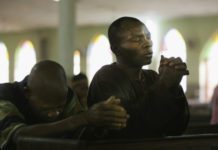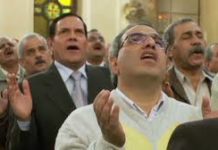By BosNewsLife Middle East Service

CAIRO, EGYPT (BosNewsLife)– Rights activists on Monday, December 5, condemned the election victory of Egypt’s “anti-Christian” “radical Islamists” in round one of the country’s first parliamentary elections since the ouster of President Hosni Mubarak in February.
“Sadly, Egyptian Christians are entering into a time of intense persecution,” said Aidan Clay, regional manager for the Middle East of advocacy group International Christian Concern (ICC). “The worst fears of many Egyptian Christians and secularists are now becoming a reality,” he told BosNewsLife.
Most “disconcerting for [Egypt’s minority] Coptic Christians” is that “one in four Egyptians opted for the ultraconservative Salafists, whose interpretation of Islam derives from Wahhabism in Saudi Arabia,” ICC said in a statement.
“In post-revolution Egypt, Salafists have been accused of committing several vicious attacks against Egypt’s Christian minority, including the torching of a church and the killing of 12 Christians in the Imbaba district of [the capital] Cairo on May 7,” ICC recalled. “Many Christians”, it said, “fear that laws instituted by Salafists will be similar to those enforced under the Taliban in Afghanistan.”
Overall, Islamists received roughly 65 percent of the vote last week in the first of three rounds to elect the lower house of parliament which began November 28 and ended Monday, December 5, according to official results.
The Muslim Brotherhood’s Freedom and Justice Party emerged with just over 36 percent of the 9.7 million ballots cast last week, followed by the Salafists’ Al Nour Party, known as Wahabbi Muslims, who garnered more than 24 percent.
Egypt’s elected parliament receives authority to select a 100-member panel to draft a new constitution that will be put to a referendum before the presidential election in June. However, “An Islamist majority in the parliament will use its power to base the constitution on Sharia law, greatly restricting the rights of non-Muslims, especially Christians,” ICC warned.
“My father is seriously thinking about sending me and my brothers elsewhere because he thinks we won’t have a future in the country with the Salafis,” Nardine, a Christian banker in her 20s, was quoted as saying by French news agency AFP.
While Egyptians wait for the final two rounds of elections for the lower house, or People’s Assembly, later this month and in January, ICC investigators cautioned that “there is little hope” results improve for the country’s “Christians and liberals.” Votes in key electoral districts of Egypt’s two largest cities, which were believed to have the a more moderate support base, have already been counted, confirmed Barry Rubin, director of the independent Global Research Affairs (GLORIA) Center.
“If the [supposed] moderates do that bad in the big cities, what’s going to happen in the villages up the Nile?” he wondered. “The Brotherhood came in first in Cairo and Alexandria. Think about that. Of course there are millions of migrants from rural areas in those places, but that’s also where the middle class, such as it is, lives.” ICC’s Clay said.
“There was some hope that at least contending Islamist parties would steal seats from one another. However, that did not prove to be the case. Coming in second place, Salafists will drive the Muslim Brotherhood toward ultra-conservatism.” He warned that “The Brotherhood no longer needs to appear moderate when the majority of Egyptians have voted in favor of radical Islam and its natural end point, Sharia” or Islamic, law. Egyptian Christians, often known as ‘Copts’, comprise roughly 10 per cent of Egypt’s 80 million, heavily Muslim, population, according to official estimates.








